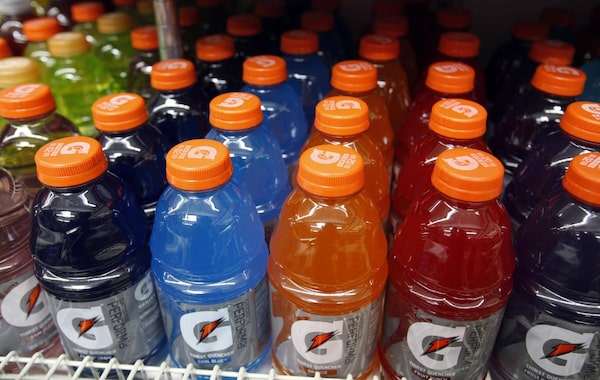
A position statement from the Canadian Paediatric Society says children and teens should avoid energy-boosting beverages because of serious health risks, including heart problems and delusions.Paul Sakuma/The Associated Press
Beverages such as Gatorade and Red Bull promise to deliver vitamins and electrolytes as they hydrate and boost performance. But when your kids are tired and thirsty, the best choice for them is water, the Canadian Paediatric Society says.
Children and teens should avoid sports drinks and caffeinated energy drinks, which pose a range of health risks from obesity and dental caries to heart rhythm problems and delusions, the national association of pediatricians said in a new position statement released on Tuesday.
"We've been noticing over the years that sports drinks and caffeinated energy drinks are becoming more and more prevalent, and a lot of children and teenagers do consume them," said Dr. Catherine Pound, a co-author of the position statement and pediatrician at the Children's Hospital of Eastern Ontario.
But given the dangers they pose, "the Canadian Paediatric Society is advocating for continued legislation to prevent marketing of these energy drinks and sports drinks to children and adolescents in general," she said.
Currently, advertising caffeinated energy drinks to young people is restricted by Health Canada regulations and voluntary marketing codes adopted by the beverage industry, the statement says. But energy drinks are still often targeted to young people at sporting events and on social media, and through its packaging, Pound said.
"Hopefully this statement will start the discussion and get people to think about that a little more, and hopefully we will see policy changes in the future," she said.
According to a study published earlier this year in the journal Preventive Medicine Reports, a University of Waterloo-led team of researchers found nearly 74 per cent of young people, ages 12 to 24, who responded to a national online survey, reported ever having consumed energy drinks, and close to 16 per cent said they had done so in the past week. Among the youngest of the 2,040 respondents, who were between the ages of 12 and 14, 57 per cent said they had tried an energy drink.
The Canadian Paediatric Society's position statement points out sports drinks and caffeinated energy drinks are different beverages. While sports drinks are marketed for their ability to replenish electrolytes, supply carbohydrates, prevent dehydrating and enhance endurance, caffeinated energy drinks are marketed as increasing energy or alertness, the statement said.
Since sports drinks do not typically contain caffeine, the Canadian Paediatric Society's concerns about them focus mainly on the risk that these sweetened drinks may contribute to obesity and dental caries.
"Water is sufficient for most children engaging in physical activity," Pound said.
Sports drinks may be appropriate for a small percentage of children who are athletes and perform vigorous physical activity for longer than an hour or two in hot, humid environments, she said. "But for the vast majority of children, they are not recommended."
When it comes to energy drinks, the maximum amount of caffeine allowed in them in Canada is 180 mg per single-serving container, the position statement notes. (By comparison, it states, an eight-ounce cup of coffee contains between about 118 to 179 mg of caffeine.) Health Canada recommends a maximum daily intake of 85 mg of caffeine for children ages 10 to 12, and 2.5 mg of caffeine per kilogram of body weight for those ages 13 and older. For children ages 7 to 9, the maximum daily intake is 62.5 mg, and for children, ages 4 to 6, the maximum is 45 mg.
While energy drinks tend to come in under that daily maximum for older children, they still pose a risk. (A 250-mL can of Red Bull contains 80 mg of caffeine, the same amount as in a 237 mL can of V8+Energy drink. A 591-mL bottle of Glacéau Vitaminwater contains 50 mg of caffeine.)
Pound emphasized the amounts highlighted by Health Canada are the maximum amounts deemed potentially safe, and that children and teens should aim to consume less.
One of the concerns is that children and teens are more susceptible to the adverse side effects of caffeine because of their lower body weights and potentially because of a lack of tolerance, Pound explained.
The position statement noted that detrimental effects associated with consuming caffeinated energy drinks have been reported in children as young as eight years old, including tachycardia, or a racing heart, increased blood pressure, vomiting, agitation, delusions and even death.
Pound said caffeine overdoses in children and teens are rare but serious, and children with underlying chronic diseases may be at higher risk of side effects. Caffeine may also increase the side effects of certain stimulant medications, including those used to treat attention deficit hyperactivity disorder.
The position statement adds that some studies suggest children are more likely to develop a dependence on caffeine. In addition, it states mixing caffeinated energy drinks with alcohol has been associated with a host of risks, including an increase in risk-taking behaviours and injuries, drinking more heavily, as well being sexually assaulted or sexually assaulting others.
Dr. David Hammond, a professor and Canadian Institutes of Health Research chair in public health at the University of Waterloo's School of Public Health and Health Systems, said the Canadian Paedatric Society's position statement falls in line with what researchers know about energy drinks and how they're used and marketed.
"Whether or not [energy drink companies] are intentionally advertising to young people, these ads reach young people," said Hammond, who was not involved in writing the position statement.
A lot of the marketing of energy drinks associates them with "partying, excitement and sports," he said.
One step energy drink companies can take to stop marketing to children, he said, is to quit sponsoring sports events, such as BMX biking competitions, snowboarding and other sports that are known to be of interest to young people.
 Wency Leung
Wency Leung